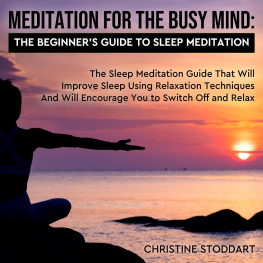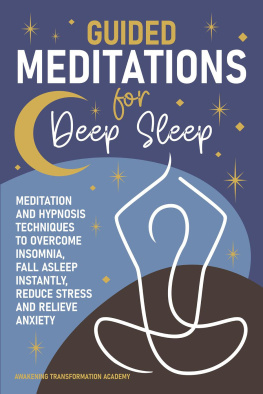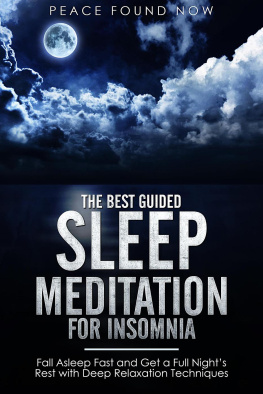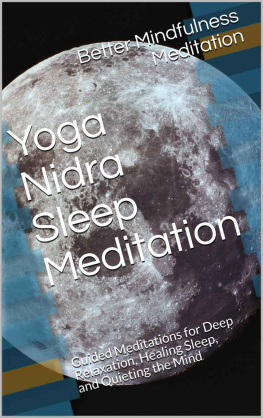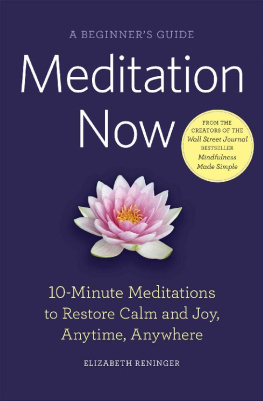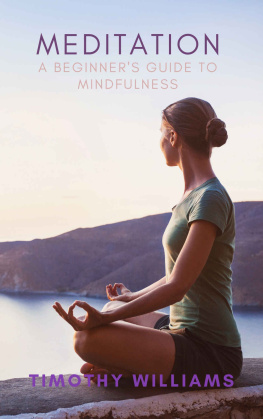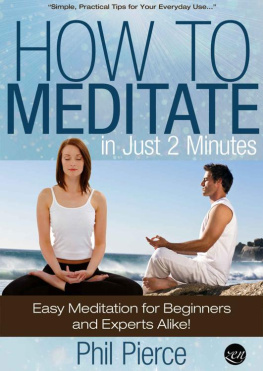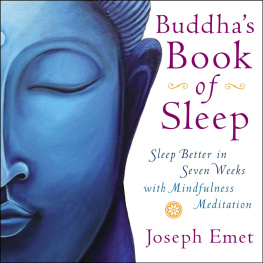Meditation for The Busy Mind: The Beginner's Guide to Sleep Meditation
The Sleep Meditation Guide That Will Improve Sleep Using Relaxation Techniques That Will Encourage You to Switch Off and Relax
By
Christine Stoddart
TABLE OF CONTENTS
PAGE 3 | COPYRIGHT PROTECTION
PAGE 4 | INTRODUCTION
PAGE 7 | MEDITATION FOR THE BUSY MIND
PAGE 8 | Allowing Your Mind to Become Still
PAGE 8 | Words You Use Are Only Symbols
PAGE 9 | Contemplation, Concentration, Meditation
PAGE 9 | Surface View & Unified Understanding
PAGE 9 | Mind and Meditation
PAGE 11 | Sleep Meditation
PAGE 13 | Improve Sleep Using Relaxation Techniques
PAGE 15 | CONCLUSION
Copyright 2020
COPYRIGHT PROTECTION
All rights reserved. No part of this publication may be reproduced, distributed, or transmitted in any form or by any means, including photocopying, recording, or other electronic or mechanical methods, without the prior written permission of the publisher, except in the case of brief quotations embodied in critical reviews and certain other noncommercial uses permitted by copyright law.
T hese are common questions that people began to learn about meditation. In the West, the word meditation means a concentrated state of mind in serious reflection. The Latin root of the word meditation, modern, means "to heal". So "What is meditation?". You should not complicate the answer, simply understood: Meditation is an approach that anyone can use to help them cope with medical problems, stress, & anxiety by way of thought, contemplation, & reflection.
Finding the origin of meditation may be quite difficult. Meditation is deep-rooted in Asia, & countries like China, India, & Japan are practicing it for thousands of years. Tribes in South India had developed Tantric Meditation about 15 thousand years back. Tantric meditation was in common use those days. So, we can put forward that the concept of meditation emerged from Asia & took various forms all over the world. Other views about the origin of meditation claim that it originated from the human being's curiosity for the purpose of men, the purpose of the universe, & to find God by looking inside the self to realize nature & its existence.
All historians have consensus over the points that, meditation has evolved during unknown ancient times & that; it was not practiced in such a way which it is practiced today. Taoists started practicing meditation from 500 to 600 BC. Buddhists also started using meditation in the same era. In history, Buddha is one of the greatest promoters of meditation. He was the one to teach meditation in Asia during 500 BC. Buddha has introduced the basic forms of meditation, & all the world adapted & transformed these meditation techniques according to their needs & purposes.
An important point to note here is that Eastern countries were the origin of meditation & getting relief through various meditation techniques. West had adapted this culture from the East. During the 20th century, Western researchers conducted researches on meditation & came to know about its physical & psychological benefits. Since then, they are using meditation as a widespread practice in their culture. Western population widely practiced meditation for peace of mind & to get relief from daily life stresses. Nowadays, a downfall has been observed in practices of meditation, & the reason is lack of time.
Many years ago, meditation was considered something just not meant for modern people, but now it has become very popular with all types of people. Published scientific & medical evidence has proved its benefits.
Meditation encompasses a variety of practices that are somewhat different while holding to the basic principles of consideration & quiet thought to bring about a state of rumination. Various types of meditation that are recognized include prayer, Zen, Taoist, mindfulness, & Buddhist. Some methods of meditation may require the body to be absolutely still or to be moved with controlled deliberation, while other types allow for free movement of the body. While the methods are different, the end goal of all types of meditation leads to a mind that is quieted & free from stress by the use of quiet contemplation & reflection.
MEDITATION FOR THE BUSY MIND
The Beginner's Guide to Sleep Meditation
M editation is not simply a process of reflection or contemplation, nor is it mere daydreaming or relaxation. Meditation is a technique or practice that involves training your attention & mental awareness & bringing your mental focus under control.
Meditation isn't easy. It takes time, energy & effort, concentration, determination, & discipline. To be a successful meditator you will need these personal qualities but the results you will experience in your everyday life will be worthwhile & this is why so many people persevere. Although it is easier to just sit back & watch television, this will not allow you to get rid of the feelings of unease & unrest experienced by so many people in today's rushed societies. These feelings may go away for periods of time but unless they are dealt with, they will always come back.
The process of meditation allows us to quieten our minds & allows us to gain access to the inner source of strength that can provide us with wisdom & guidance. It also teaches us to control rather than be controlled by our thoughts & emotions. Some people focus on an object, perhaps a candle, a sound, or your breath. This allows your mental activity to settle down & results in you becoming more peaceful, calm, & focused.
When you first start meditating you will probably find that your mind jumps all over the place, from one topic to another, & you may find it difficult to find the silence between your thoughts. This is normal. When this happens just notice that you have had thought & let it go. Overtime & with practice the space between your thoughts will increase.
Allowing Your Mind to Become Still
Meditation is the way you reconnect with the overarching & underlying essence of your own being. It is a process of uncovering & discovering who you really are in a way that transcends your restricted definitions about who you are & is based on learning how to allow your mind to become still.
Words You Use Are Only Symbols
It is easy to forget that words are symbols, not the thing itself. When you say a word, communication occurs as someone gets an image & understanding associated with that word, but the word never really possesses the color, flavor, texture, reality, & being of the thing the word describes. In meditation, you learn to have an open mind, & a quiet mind, & this opens up an entirely new way of being because you begin to be able to perceive things directly without just thinking words about them.
Next page
